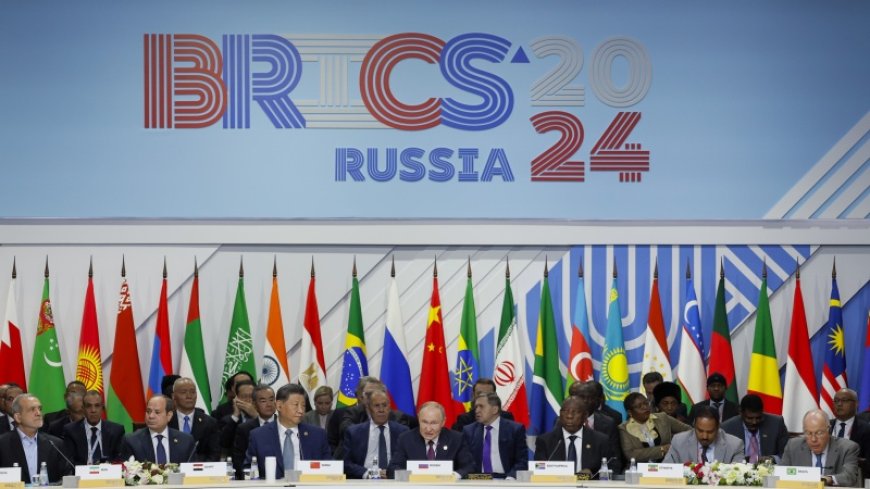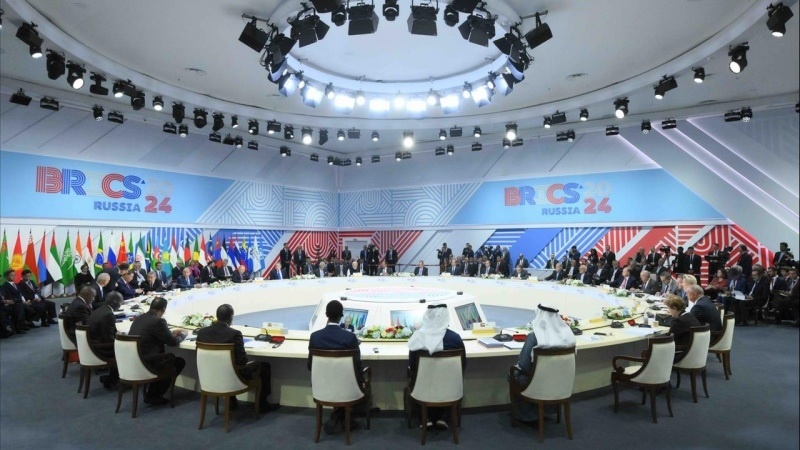Russia's response to Trump's threats against BRICS
The Russian Foreign Ministry has issued a statement regarding US President Donald Trump's threat to impose a 100 percent tariff on goods imported from BRICS countries if the dollar is eliminated from the countries' trade, emphasizing that cooperation among BRICS member countries aims to strengthen the social, economic and humanitarian potential of those countries.

The Russian Foreign Ministry has issued a statement regarding US President Donald Trump's threat to impose a 100 percent tariff on goods imported from BRICS countries if the dollar is eliminated from the countries' trade, emphasizing that cooperation among BRICS member countries aims to strengthen the social, economic and humanitarian potential of those countries.
The controversial US president announced on January 30 that the US would impose a 100 percent tariff on goods from BRICS countries if the group uses a currency other than the dollar in its international trade. He has stressed that the US will not allow the dollar to be abandoned in international trade and warned that countries that do so will face strong trade measures from the US.
With these threats, Trump is trying to prevent the collapse of the dollar's global control by threatening countries that have already been harmed by the dollar's dominance in international trade and finance as well as US policies of using it as a tool to punish and oppress other countries.
In response to Trump's threat, Kremlin spokesman Dmitry Peskov referred to Russian President Vladimir Putin's earlier remarks that there were no plans to create a common currency within the BRICS group, and that it was committed to creating new investment platforms that would allow joint investments in third-party countries.
In December 2024, and in response to Trump's threat to impose a 100 percent tariff on goods imported from BRICS countries, Putin noted that due to the actions of Democrats, the dollar no longer has the power it had four years ago during Trump's first presidency.

In late January, Russian Foreign Minister Sergei Lavrov stressed that Trump's statements about imposing high tariffs on BRICS members and withdrawing from some international agreements demonstrate the tactics used by Washington to safeguard its interests in the world. He recalled that US interests have always been protected on the basis of wanting to make the United States appear superior to its international competitors.
The US abuse of the dollar as a tool to oppress other countries has always been the most criticized issue in the current international financial system. Although the dollar is still the world's largest reserve currency, the US's use of it as a weapon to secure its global goals has prompted many countries to invest in alternative currencies.
Washington's use of the dollar as a tool to exert pressure on other countries, along with economic sanctions against rival countries, has led these countries to decide to use national currencies in their financial and trade transactions.
In 2009, the world's powerful and emerging economies attempted to establish a political and economic union without the involvement of Western powers, which was called BRICS. At the top of the BRICS group, China and Russia want to end the dominance of the state and economic power of Western countries in trade relations. Russia, as a key member of the BRICS group, along with other members, such as Brazil, India, China, and South Africa, and later Iran, Ethiopia, Indonesia, the United Arab Emirates, and Egypt, want to use their national currencies in all international transactions.
The BRICS member countries have many reasons to use their national currencies in economic and trade exchanges and also to create a new BRICS currency. The BRICS currency is a common currency that was launched by Russian President Vladimir Putin during the BRICS summit in Kazan in October 2024. At the summit, Putin unveiled a "Single Currency" note in front of the member countries of the community.
The BRICS members launched the BRICSPay platform at the summit and said that it could have many benefits such as eliminating the dollar, facilitating trade between members and reducing the impact of Western sanctions. This currency is designed to reduce dependence on the US dollar and create an independent financial system. Recent global financial challenges and aggressive US foreign policies have led the BRICS countries to follow this path. They want to take steps to protect their economic interests while reducing their global dependence on the US dollar and the Euro.

President Putin said in this regard: "The influence of the dollar on the international level is decreasing. Given that the share of the United States in the world economy is decreasing, it is clear that the influence of the dollar on world economic processes is also decreasing. With this, new tools will enter the arena and no one can prevent the use of these new technologies and tools."
Pointing to the continued decline in the world's confidence in the dollar, Putin said: "Even the US's own allies are reducing their gold and foreign exchange reserves in dollars, to the extent that the dollar's share in these reserves has decreased by 13 percent over the past 13 years."
Trump's threat against BRICS members by announcing a 100 percent tariff against them if they use the BRICS currency reflects Washington's fears about changing global financial and trade trends.













































